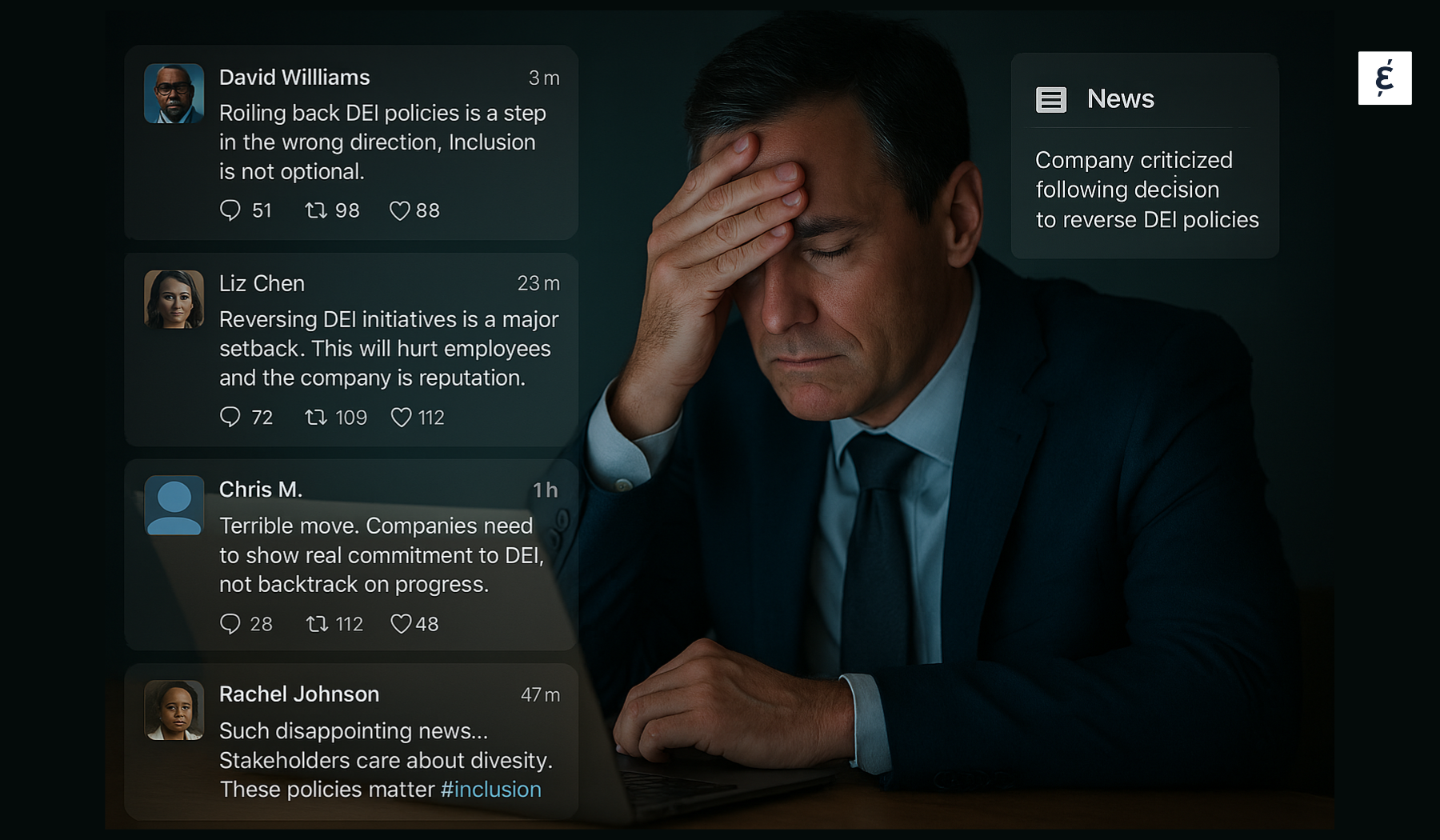

In the age of AI, the polycrisis and culture wars, companies must strive to be more authentic, more relatable – and more human, argues Caliber CEO Shahar Silbershatz.
Reputations, it’s often said, take years to build but seconds to ruin, which is why most businesses remain on red alert for reputational risks.
Gazing into the crystal ball, I see three trends that will threaten businesses in 2024 – but also give them opportunities to build or burnish their reputations.
The first is artificial intelligence and its increasing impact on business.
The good news is that the increasing use of AI – such as tools that allow companies to listen to what people are saying about them online and help them respond to corporate crises – will help them manage their reputations more effectively.
Others will use generative AI to tailor their messages to ever more discrete audiences and save time and resources.
Using these tools ethically and transparently will be key, of course. Companies that do so will become more trusted, liked and relatable to stakeholders.
The bad news is that companies will unwittingly use generative AI to publish inaccurate or plagiaristic content. Some will suffer security breaches – like data leaks – and others will see algorithmic biases roll back diversity and inclusion gains.
More than ever, companies must consider AI’s broader impact on society next year.
Businesses that replace employees with AI and put vast numbers of people out of work may suffer reputational harm.
Companies must also show leadership by investing in measures to protect their customers’ data.
Many companies will also face the growing risk of disinformation and misinformation.
Deep fakes, in particular, will compromise more companies and damage reputations.
“Malgorithms” that place company ads in inappropriate places will raise brand suitability red flags. And the gradual erosion of trust in authority will weaken hard-won reputations.
The second threat to corporate reputation in 2024 will come from geopolitical turmoil.
For many companies, the crisis will be specific – a conflict, say, or an environmental disaster – and the response warranted – a threat to supply chains in one country or danger to employees in another.
But many others will be expected to take a stand in response to a particular event (like the Israel-Hamas war) or a burgeoning social movement (like Black Lives Matter).
The trick will be knowing when to react. For many companies, the risk is getting it wrong, leaping aboard a bandwagon and coming across as insincere or inauthentic.
Still, the seemingly relentless stream of macro-events known as the “polycrisis” also gives companies an opportunity to strengthen their reputations. How? By responding to events in ways that demonstrate their values and purpose in a meaningful and relatable way.
Next year, stakeholders will especially value companies that demonstrate emotional intelligence and speak to them authentically.
The third threat to corporate reputation in 2024 will be climate change – but not just for the usual reasons.
As global temperatures approach the 1.5 Celsius threshold, discussing ESG and other sustainability goals will be fraught with risk.
For some companies, the reputational pitfalls will lie in the regulatory realm.
Even as they strive to reduce emissions, companies will face greater scrutiny – especially from regulators challenging their ESG claims.
The consequence of falling foul won’t just be a fine but reputational damage.
For other companies, the challenge will be subtler.
The backlash against ESG activities and other corporate goals aimed at improving society – denigrated as “woke” by some journalists, politicians and investors – will grow in 2024, especially in the run-up to what’s expected to be another bitterly disputed US presidential election.
These companies will struggle to maintain their reputation with all stakeholders.
As they navigate the choppy waters of the culture wars, though, companies will still be able to strengthen their reputations.
How? By speaking openly, honestly and authentically, showing stakeholders their human side and sticking to their promises and values.
Again, companies that communicate with empathy and sincerity about climate change and their response to it can become more trusted and liked, even as the world burns.
Still, here’s what could make 2024 especially parlous for reputation: the three trends potentially overlap.
For instance, a company that engages in “greenhushing” – avoiding publicity of its sustainability goals and actions to sidestep the ESG backlash – may inadvertently create an information vacuum.
Consequently, some people may draw mistaken conclusions about the company, while others will use the vacuum to create deep fakes. That can erode stakeholder trust and damage the company’s reputation.
Likewise, a company’s failure to say something about a major event creates a similar void – one that’s ripe for disinformation, misinformation and misinterpretation.
But that’s not all. Corporations are increasingly becoming “juicy targets for foreign disinformation”, with hostile actors targeting companies with “online slanders” on “noncredible” websites that traditional media monitoring tools simply can’t catch.
In 2024, then, companies need to be better prepared than ever. That means taking a more proactive approach to managing their story and using the right tools to monitor their stakeholder universe.
But it also means prioritizing soft skills and empathy and being more responsive to the needs of their customers, employees and other stakeholders. In the age of AI, this may be as simple as having real people communicate with customers – and fostering real relationships.
Authenticity will be more vital than ever, too. Companies must pick their battles wisely – and remember that they can’t please all the people all the time. Instead, they should take positions aligned with their purpose – and explain what they’re doing, why they’re doing it and how it will affect stakeholders.
Likewise, if they choose not to take a position, they should explain why – clearly, honestly and sincerely.
In other words, to protect their reputation in 2024, companies must stand up for their beliefs, remain loyal to their values and strive to be as relatable as possible.






© 2024 Group Caliber | All Rights Reserved | VAT: DK39314320